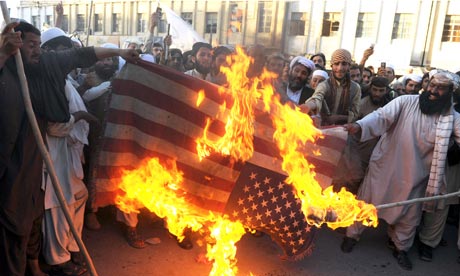US forces mounted secret Pakistan raids in hunt for al-Qaida
Former Nato officer reveals secret night operations in border region which America kept quiet
American special forces have conducted multiple clandestine raids into Pakistan's tribal areas as part of a secret war in the border region where Washington is pressing to expand its drone assassination programme.
A former Nato officer said the incursions, only one of which has been previously reported, occurred between 2003 and 2008, involved helicopter-borne elite soldiers stealing across the border at night, and were never declared to the Pakistani government.

Demonstrators in Quetta protest against US threats to extend drone strikes into the Balochistan region, which US military chiefs fear is becoming a Taliban ‘hub'. Photograph: Banaras Khan/AFP/Getty Images
Such operations are a matter of sensitivity in Pakistan. While public opinion has grudgingly tolerated CIA-led drone strikes in the tribal areas, any hint of American "boots on the ground" is greeted with virulent condemnation.
After the only publicly acknowledged special forces raid in September 2008, Pakistan's foreign office condemned it as "a grave provocation" while the military threatened retaliatory action.
The military source said that was the fourth raid of previous years. Two of the others targeted Taliban and al-Qaida "high-value targets" near the border, while the third was to rescue a crashed Predator drone. He said that one of the capture raids succeeded, the other failed and the US sent elite soldiers to the downed Predator because they did not trust Pakistani forces. "People were afraid they would take the parts and reverse- engineer its components," he said.
The secretive nature of the raids underscores the suspicious nature of the relationship between the two allies as they argue about Washington's latest demands.
Disrupting the Taliban safe haven inside Pakistan is the unspoken part of Barack Obama's "surge" announced this month. Although 30,000 troops will be deployed to Afghanistan by next summer, the Taliban and al-Qaida leadership is believed to be sheltering on the Pakistani side of the 1,600-mile border.
In recent weeks Washington has sent a stream of senior officials to Islamabad seeking Pakistani action on at least two fronts: attacks on Sirajuddin Haqqani, a warlord with strong al-Qaida ties based in North Waziristan, and an expansion of the CIA-led drone strikes into the western province of Balochistan.
"This is crunch time," said a senior Pakistani official. "The tone of the Obama administration is growing more ominous. The message is 'you do it, or we will'."
In a recent New York Times article titled Take the war to Pakistan, Seth Jones, a senior civilian adviser to America's special forces commander in Afghanistan, said the Afghan war was "run and organised out of Balochistan" by the Quetta shura, a 15-man war council led by the Taliban leader Mullah Omar. "Virtually all significant meetings of the Taliban take place in that province, and many of the group's senior leaders and military commanders are based there," he said.
The US demands have drawn an angry reaction from Pakistan's military. A senior official with the ISI, Pakistan's premier spy agency, said it was hunting the Taliban in Balochistan, citing 60 joint operations between the CIA and ISI in the province over the past year. "They are going in for kills, they are apprehending people. CIA and ISI operatives depend on each other for their lives in these operations," he said. The official, who spoke anonymously but with official sanction, said Pakistan's military were overstretched. "We can't fight everywhere at once," he said. Since October the army has been at war in South Waziristan, stronghold of the "Pakistani Taliban" whose suicide bombers have killed more than 500 people in cities over the past two months.
US generals say the army is playing a "double game", turning a blind eye to "Afghan Taliban" sheltering in Balochistan because it considers them strategic assets as part of a wider gambit to check Indian influence in Afghanistan.
The ISI official denied such links and accused the US of "scapegoating" Pakistan for its own failures. "During the past year there has been zilch actionable intelligence about the Quetta shura or Haqqani," he said. "If they are so sure Mullah Omar is in Quetta or Karachi, why don't they tell us where he is?"
The CIA declined to comment. "We don't as a rule comment on the agency's relationship with foreign partners or on reports of our operational activities," it said.
The aggressive American approach to Balochistan contrasts with the low-key British tone, despite the fact Balochistan lies across the border from Helmand, where 9,000 British troops are fighting the Taliban.
A British official said the government was reluctant to publicly criticise Pakistan for fear of endangering the relationship between MI6 and ISI in tracking suspected extremists moving between Britain and Pakistan. "That's our priority. It's a matter of national security," he said.

No comments:
Post a Comment